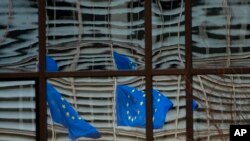British and EU negotiators have dug in their heels and each is demanding more concessions from the other as post-Brexit trade talks dragged on into Sunday, deadlocked on fishing rights.
Sources from each side said that unless the other backed down on access to U.K. waters, Britain would leave the single market at midnight December 31 without a deal on cross-channel commerce.
"We're continuing to try every possible path to an agreement, but without a substantial shift from the [European] Commission we will be leaving on WTO terms on 31 December," a British government source said.
But an EU diplomat told Agence France-Presse that Brussels had made Britain its last offer on fishing and it was down now to U.K. Prime Minister Boris Johnson to decide whether he wanted a deal.
"If Britain doesn't accept the latest EU offer, it will be a 'no deal' over fish," he warned. A European official said: "It's very blocked."
The tough talk came as both sides engaged in intense negotiations to secure a pact before the end of the month. No deal would risk chaos at EU and U.K. borders, where a pre-deadline rush has caused long lines of lorries.
Observers, however, noted that the fishing issue was about finding middle ground between offer and counteroffer in an economically small sector, while the much bigger other main issue, on guaranteeing fair trade competition rules, was closer to settlement.
"It's all down to numbers now," the European diplomat said.
The EU's lead negotiator, Michel Barnier, has proposed that EU fishermen give up nearly a quarter of the value of the fish they currently catch in U.K. waters. Britain is understood to be holding out for getting back much more than half.
The U.K. has suggested this compromise last for three years before it is renegotiated, whereas Europe is holding out for double that.
Fishermen 'sold down the river'
EU fishermen fear losing any access to the rich U.K. fishing waters will threaten their livelihoods.
"We are in the throes of being sold down the river," the European Fisheries Alliance said in a statement, urging Barnier to stick to protecting them. "The shape of a deal as currently stands would give a huge blow to the European seafood sector, which is made up of more than 18,000 fishermen and 3,500 vessels with an annual turnover of 20.7 billion euros."
Time is very short to reach an accord. The European Parliament has highlighted a deadline of midnight (2300 GMT) on Sunday to receive a deal for review if its members are to ratify it before the end of the year.
Their U.K. parliamentary counterparts are in recess but can be recalled within 48 hours to do likewise.
But EU capitals are not binding themselves to the European Parliament's deadline.
France's European affairs minister, Clement Beaune, said talks would not be called to a halt if they dragged out past Sunday night.
'Concerns' Britain not ready
The urgency of reaching a deal is seen in long lines of trucks at the freight rail link through the Channel tunnel as British companies frantically stockpile.
A group of U.K. MPs warned Saturday that Britain had not installed the complex IT systems and port infrastructure needed to ensure trade with the EU runs smoothly.
Some disruption is inevitable, deal or no deal, with British and European firms needing to fill out import-export, health and tax forms to send and receive goods to each other.
A deal would avoid tariffs but there would still be traffic snarls as checks on truck loads and drivers' papers are carried out.





